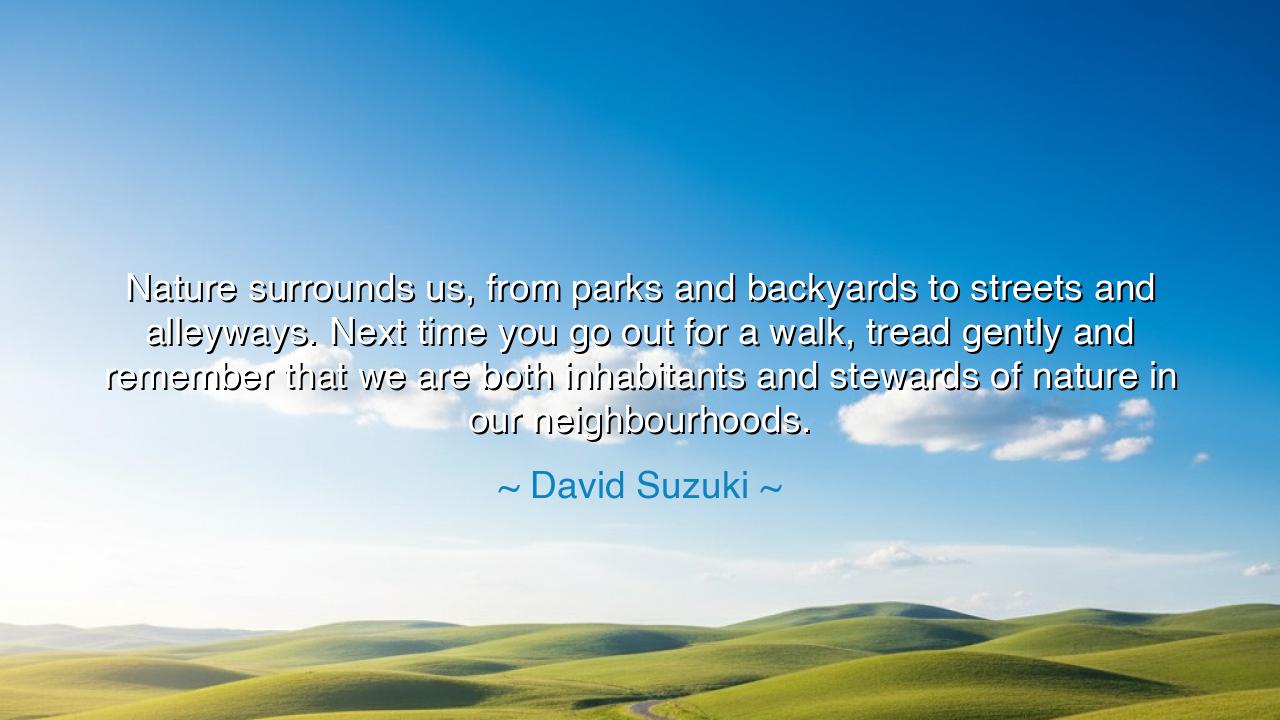
Nature surrounds us, from parks and backyards to streets and
Nature surrounds us, from parks and backyards to streets and alleyways. Next time you go out for a walk, tread gently and remember that we are both inhabitants and stewards of nature in our neighbourhoods.






“Nature surrounds us, from parks and backyards to streets and alleyways. Next time you go out for a walk, tread gently and remember that we are both inhabitants and stewards of nature in our neighbourhoods.” Thus spoke David Suzuki, the voice of science and wisdom, whose life has been devoted to reminding humanity of its fragile bond with the earth. His words do not summon us to distant forests or untouched mountains alone, but to the nature that lives in the very places we overlook—beneath our feet on the street, in the branches above our windows, in the soil of our gardens and the cracks of our sidewalks.
The meaning of this teaching is both humbling and uplifting. Too often, people imagine nature as something far away, set apart from human life—wild reserves, national parks, or distant oceans. But Suzuki calls us back to awareness: the sparrow in the alleyway, the dandelion breaking through concrete, the tree offering shade in a city square—these too are nature. We are not separate from them; we live within the same web. To be reminded that we are inhabitants of this shared home is to recall our kinship with all life, and to be named stewards is to remember our duty to protect it.
History provides examples of what happens when this truth is forgotten, and when it is remembered. In ancient times, the Indigenous peoples of Turtle Island (North America) lived with an understanding that every patch of land, whether forest or plain, was sacred, and that the people were caretakers rather than masters. Contrast this with the great industrial smogs of nineteenth-century London, when humans treated nature as enemy or tool alone, choking their own cities with pollution until even children struggled to breathe. In these stories, Suzuki’s words find their echo: when we tread gently, we thrive; when we do not, both nature and humanity suffer together.
The origin of Suzuki’s wisdom lies in his lifelong work as a geneticist, broadcaster, and environmental activist. For decades he has spoken of the fragile balance of ecosystems and of humanity’s responsibility to guard them. But here his words grow personal and close: not the grand speeches of conferences, but the simple instruction for a walk. In urging us to tread gently, he teaches that the environmental struggle is not only waged in parliaments and laboratories, but also in the smallest actions of daily life—in how we look, how we walk, how we live among the living world.
There is a heroic power hidden in such gentleness. For to tread lightly in a hurried world, to notice the ant crossing the path or the bird gathering twigs, is itself an act of resistance against the blindness of greed. The one who learns to see nature in the streets and alleyways learns also to act with care in greater matters. Thus, stewardship begins with awareness. The step that spares the flower becomes the hand that preserves the forest. The heart that honors a single tree becomes the voice that defends the earth.
The lesson for us is this: begin now, where you stand. Look not only to distant causes, but to your own neighbourhood. Plant a tree, tend a garden, leave food for the sparrows, reduce the waste that poisons soil and water. Teach your children not only the names of animals in books, but the names of those that live around your home. When you walk, walk as though upon holy ground, for holy ground it is. In such small steps, the vast work of stewardship is born.
Therefore, dear listener, take David Suzuki’s words into your heart. Do not imagine yourself separate from the living web that holds you. You are both inhabitant and steward, guest and guardian. Tread gently, that those who come after you may also walk among trees, hear birdsong in alleys, and see flowers blooming between stones. For in every step lies a choice: to wound the earth, or to honor it. Choose honor, and in doing so, you honor life itself.






AAdministratorAdministrator
Welcome, honored guests. Please leave a comment, we will respond soon